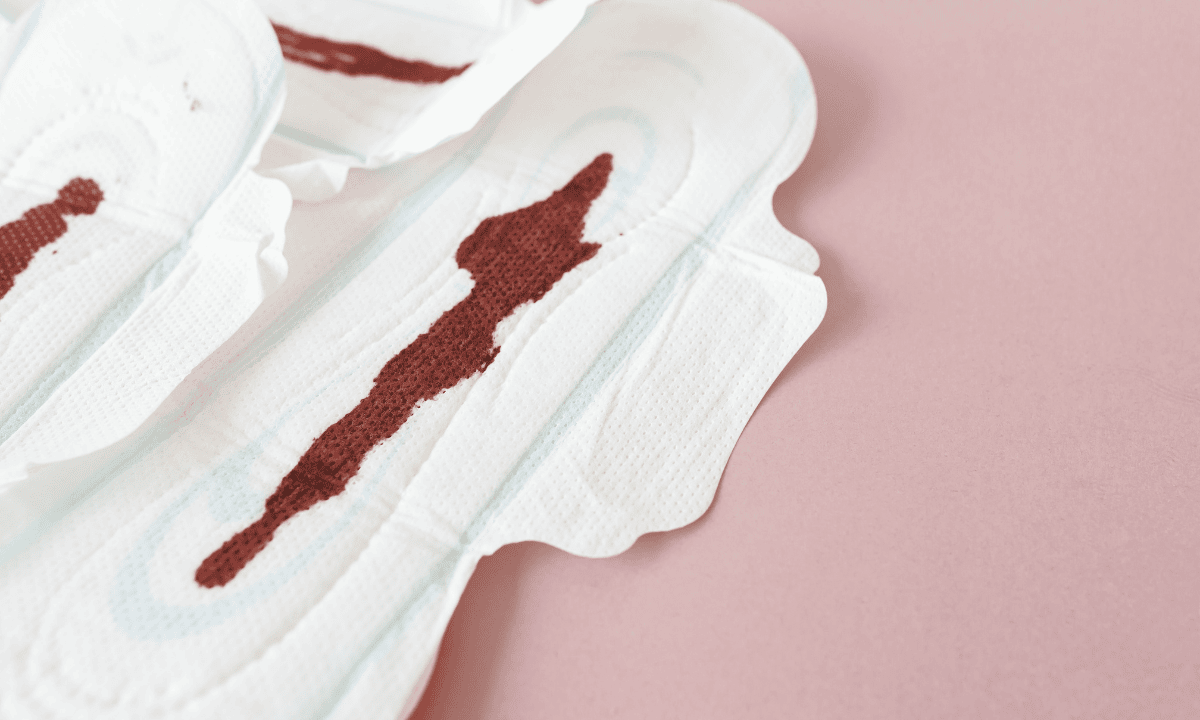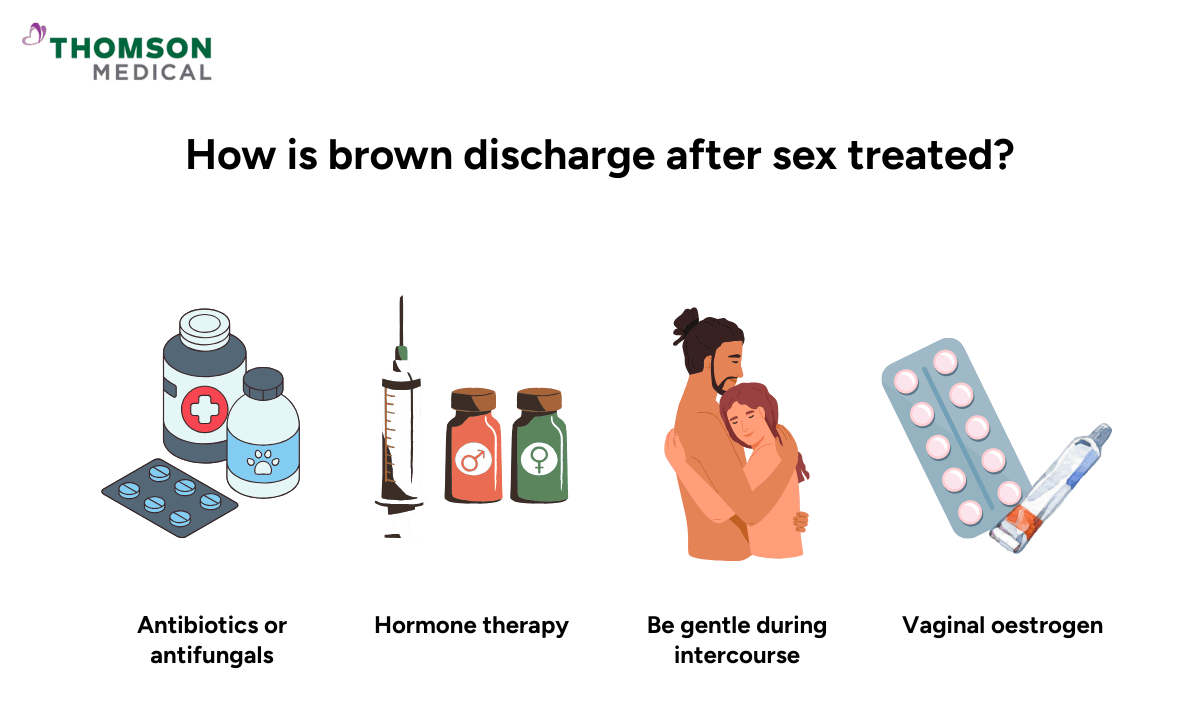Brown discharge after sex can be unsettling, especially if you're not expecting it. Unlike bright red bleeding, that brownish color raises different questions: Is this old blood? Is something wrong with my cervix? Should I see a doctor? While brown discharge is often harmless, it can sometimes indicate conditions that need attention.
What does brown discharge after sex mean?

Vaginal discharge is a normal fluid that keeps your vagina clean, moist, and protected from infection. The colour, amount and texture of discharge can change during your menstrual cycle and different stages of life.
Sometimes, you may notice brown discharge specifically after having sex. This usually happens when a small amount of old blood mixes with your vaginal fluid. Such spotting is often due to minor irritation, small tears, or friction during intercourse.
Brown discharge can happen for other reasons, including hormonal changes, cervical irritation, ovulation, early pregnancy, or, in rare cases, underlying medical conditions like endometriosis.
While they are often harmless, it is advisable to consult a doctor if it happens frequently, is heavy, or is accompanied by pain, fever, or a foul odor to rule out any serious issues.
Is brown discharge after sex normal?
Yes, brown discharge often just means old blood leaving your body. The blood turns brown as it mixes with air and oxidises before leaving your vagina. It is commonly harmless and often clears on its own. However, if you notice the brown discharge keeps coming, happens often after sexual intercourse, or comes with pain, itching, or a strong smell, it could be a sign of a health problem.
What can cause brown discharge after sex?
Brown discharge after sex can happen for many reasons. Most of the time, it is harmless, but sometimes it can be a sign of a medical issue.
Here are some of the possible causes::
Minor irritation or small tears in your vaginal walls during sexual intercourse
If you experience vaginal dryness
Your cervix may be sensitive and bleed slightly after sexual contact
Hormonal changes during your ovulation, or from your birth control
Old menstrual blood can mix with your vaginal fluid, especially just before or after your period
If you're in early pregnancy, you can experience light brown spotting called implantation bleeding
Sometimes, however, brown discharge may be related to underlying medical conditions that require attention. If this is the case, possible causes include:
Cervical polyps (small non-cancerous growths on the cervix) can bleed after sexual intercourse and cause brown discharge
Vaginitis can inflame your vagina and lead to blood-stained discharge
Sexually transmitted infections (STIs), such as chlamydia or gonorrhoea, can cause spotting and unusual discharge
Pelvic inflammatory disease (PID) can infect your womb, causing pain, bad smell, and brown discharge
If you’re unsure whether your brown discharge is normal or a sign of infection, request an appointment with Thomson Medical. Our specialist will perform a thorough assessment to ensure your reproductive health stays protected.
Gynaecologist in Singapore
Loading...
When should you be concerned about brown discharge after sex?
It is important to recognise when brown discharge may indicate a problem. Watch out if you notice:
Strong or unusual odour
Pelvic pain, burning, itching, or fever
Frequent or prolonged discharge
Any bleeding during pregnancy
These symptoms could indicate infection, injury, or pregnancy complications such as an ectopic pregnancy (when a fertilised egg grows outside your womb).
Can brown discharge after sex be linked to pregnancy?
Yes, it can. If you're pregnant, you might experience brown discharge for several reasons:
Implantation bleeding:
This typically occurs 7 to 14 days after conception and is usually lighter than the spotting mentioned earlier.
Cervical changes:
During pregnancy, your cervix becomes softer and has more blood flowing through it, so gentle bleeding can happen after sexual intercourse or a check-up.
How is brown discharge after sex treated?

Treatment of brown colour discharge after intimacy depends on the cause. Your doctor may recommend the following:
Hormone therapy can help adjust your hormonal imbalance or birth control effects
Antibiotics or antifungals can treat infections such as bacterial vaginosis or yeast infections
STI treatment may be needed for both you and your partner
Vaginal oestrogen helps relieve dryness if you have low oestrogen, especially after menopause
Surgery may be required for cervical polyps or fibroids
Brown discharge after sex can also be managed with home care practices:
Using lubricants and being gentle during intercourse can help prevent minor tears
Managing stress is important as it can affect your hormones and menstrual cycles
Probiotics can support your vaginal bacteria after infections, but they're not a replacement for medical treatment
If you’re unsure which treatment is right for you, request an appointment with Thomson Medical. Our specialist can assess your symptoms, recommend the safest therapy, and guide you through recovery.
How can you prevent brown discharge after sex?
Preventing brown discharge often involves gentle practices and good sexual health habits:
Use lubrication to prevent friction and small tears
Avoid rough sexual activity, especially if you feel dry
Communicate with your partner to ensure your comfort and prevent injury
Use condoms to prevent infections that can cause discharge
Get regular STI testing, especially with new partners
Inform your partner if you're diagnosed with an infection so both of you can get treatment
FAQ
Why do I have brown discharge after sex?
Brown discharge after sex often comes from light bleeding in your cervix or vaginal walls. This can happen when the tissue gets slightly irritated or dry during intercourse. The brown colour appears because the blood is old and has mixed with air. It can also occur around your period, during your ovulation, or from hormonal changes caused by your birth control. In some cases, it may relate to cervical ectropion (a harmless condition where cells from inside your cervix move outward and bleed more easily).
How is the cause of brown discharge diagnosed?
Your doctor will start by asking about your medical history and any symptoms you're experiencing. They will then do a gentle physical and pelvic exam to check for signs of irritation or infection.
Tests may include a Pap smear (a screening test for cervical cancer), swab tests for infections, blood tests to check your hormone levels or pregnancy, and a pelvic ultrasound (a scan that shows your uterus and ovaries).
Is brown discharge after sex always old blood?
Not always. While old blood is the most common cause, brown discharge can also come from small tears or irritation of your vaginal or cervical tissue. These are more likely to occur with rough sexual activity or when there's not enough lubrication.
Sometimes, hormonal changes from your birth control or ovulation can also trigger light brown spotting. Rarely, infections or other conditions may be involved, so it's best to get checked if it happens often.
Can stress or lifestyle affect brown discharge?
Yes, they can. Stress can cause hormone imbalance, especially oestrogen (a female hormone that controls the menstrual cycle). When your hormones fluctuate, your womb lining may shed a little early, causing brown spotting.
Poor sleep, sudden weight changes, or changes in your diet and exercise can have similar effects. Once your routine stabilises, the discharge usually settles too.
Does brown discharge mean infertility or cancer?
In most cases, brown discharge is harmless and not linked to infertility or cancer. It usually means old blood leaving your body. However, if you also have pain, bleeding after menopause, or discharge with a strong smell, it's best to see your doctor. They can rule out other causes and give you peace of mind.
Can brown discharge be a sign of an STI?
Yes, sometimes. Brown discharge with a strong smell, pain, or burning may signal STI such as chlamydia or gonorrhoea. If you notice these symptoms, avoid sexual intercourse until you've been checked and treated. Early treatment helps prevent further problems and keeps your partner safe too.
The information provided is intended for general guidance only and should not be considered medical advice. For personalised recommendations and tailored advice based on your unique situations, please consult a specialist at Thomson Medical. Request an appointment with Thomson Medical today.
Reference:
Tarney, C. M., & Han, J. (2014). Postcoital Bleeding: A Review on Etiology, diagnosis, and management. Obstetrics and Gynecology International, 2014, 1–8. https://doi.org/10.1155/2014/192087
Wilcox, A. J., Baird, D. D., & Weinberg, C. R. (1999). Time of implantation of the conceptus and loss of pregnancy. New England Journal of Medicine, 340(23), 1796–1799. https://doi.org/10.1056/nejm199906103402304
For more information, contact us:
Thomson Specialists (Women's Health)
Thomson Women's Clinic (TWC)
- Novena:
6592 6686 (Call), 8611 8986 (WA) - Bukit Batok:
6569 0668 (Call), 8686 3525 (WA) - Choa Chu Kang:
6893 1227 (Call), 8282 1796 (WA) Jurong:
6262 8588 (Call), 6262 8588 (WA)- Katong (female doctor):
6970 2272 (Call), 8611 9020 (WA) - Punggol:
6243 6843 (Call), 8811 0328 (WA) - Sembawang: 6753 5228
- Sengkang: 6388 8125
- Serangoon (female doctor): 6382 3313
- Tampines: 6857 6266
- Tiong Bahru: 6276 1525
